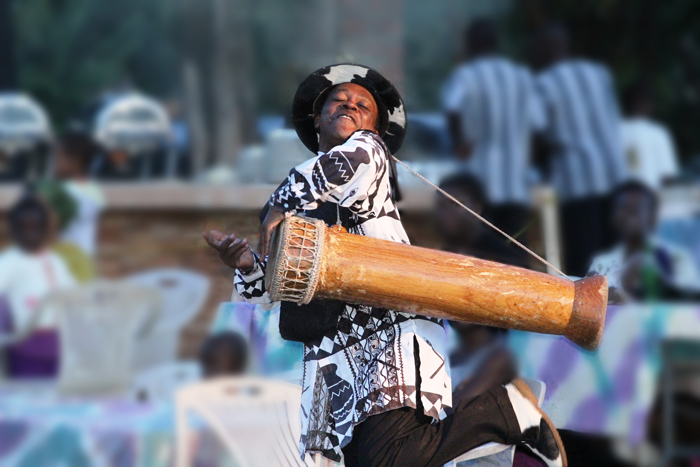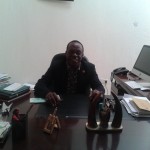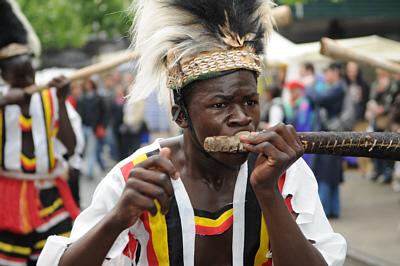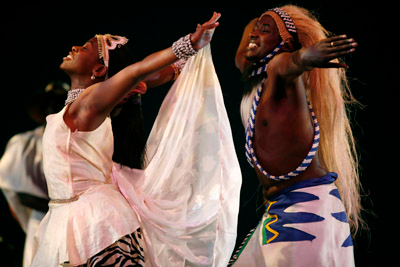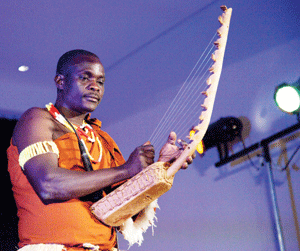-
21st Century: No Excuse to Neglect Cultural Heritage
Posted on July 25, 2014Stephen Rwangyezi: Ugandan Cultural Protagonist
A report by Evelyne Ninsiima – Uganda
Show him the drum and he will show you African music. His first show involved three people, and now millions of people. The founder of Ndere Troupe, the first and most known cultural troupe in Uganda talks about his life in reinstalling sense of pride and confidence of cultural heritage.
The 21st century, which is impelled by advanced technology is blamed every other day for failure to preserve and promote cultural heritage. Is this the case, or is it rather the adamant negligence of what we hold a key to?
Talk of devoted, I mean die hard! In this case, I refer to a Ugandan man whose life is awakened by African music.
The founder of a troupe which fascinates the world every other day, is powered by the zeal to keep African cultural heritage live in entertainment.
In this case, I introduce to you; Stephen Rwangyezi! The flute illusionist, master of the drum and the advocate of the beauty of African music.
Stephen Rwangyezi is a gifted Ugandan entertainer and performer with a sound business sense. He believes that a creative mind is the wealthiest piece anyone can afford to achieve, without begging. “The enslavement of the brain is what ties us back,” he said as he settled in his chair for my interview.Mental enslavement and stagnation is what is eating African culture in Uganda! The rest are just excuses.
In my interview with Stephen Rwangyezi, about the influence of the 21st century on cultural heritage, he said;“As long as we live, culture is as modern as now. It is the way we decide to live it. The only challenge is the influence of other cultures on us, Not Modernity or the 21st century. As Africans, we have neglected our own practices for others.”
According to Rwangyezi, mental enslavement and social stagnation is the biggest hindrance in Africa.
“Re-instill sense of pride and confidence,” he lamented.
The mission in the cultural protagonist strengthened him to conduct thorough research so that African heritage in Uganda was admired, especially with music.Ndere means “flute” in both Luganda and Rukiga languages, widely spoken in Uganda. Ndere troupe is known for their strong acrobatic performances blended with rhythmic cultural beats from local instruments such as drums and flutes made of wood, with cow skins and hides.
According to Rwangezi, a flute is such a unique instrument that is incomparable! “ It is the only instrument found in all cultures all over the world,” he said.
“The major reason for naming ourselves after a flute is its beauty with music. It is a versatile instrument that expresses all kinds of moods,” Rwangyezi added.
The flute illusionist said that the ‘flute’ helps to respect other cultures for what they are, and this was his appeal. “ If all cultures could respect each other in the world, we would be the most peaceful people. It is a symbol of peace!” He went ahead to encourage all of us to introduce the sound of the flute to our music, as a sign of humanity. Mention the Ndere cultural troupe and more or less anyone in Uganda will tell you that it’s the group that balances six pots on their heads while dancing.
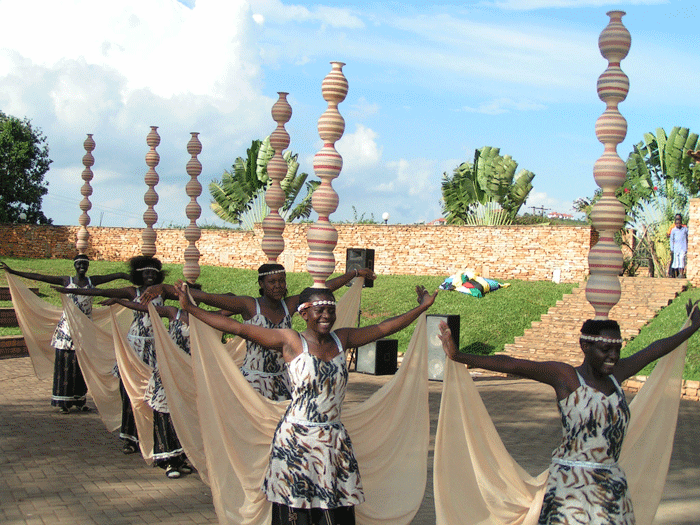
The Ndere women’s troupe balancing clay pots on their heads while dancing at the Ndere center is truly amazing.
At Ndere center, where the troupe is based, is a home for African music and dance in Kampala, the capital of Uganda.
Rwangyezi has been able to create this descent, comfortable and magnificent world of music by create confidence in other cultural dancers.
It has not been a smooth road to sustain such a venture for Rwangezi though. He has got some loans from the bank and paid them back, since his relationship in business is entrusted.
“African cultural heritage is amazing! For instance, the Kinyarwanda dance from Rwanda. It is hilarious, but would lose its touch, if we abandoned and undermined ours in adoration of theirs or any other cultures else where. Dropping what has natured us, to contradict and abuse what belongs somewhere else is a crime. Practicing it in the right way however, is definitely not bad at all,” Rwangyezi said.Such beautiful dances could not be given room for demolition, when the law of Idol and disorderly was reinforced against African activities. Traditional dances were considered disorderly, and whoever wanted to dance, enclosed himself. Traditional doctors appeared witches, and whoever was found using witchcraft was arrested. However, to Rwangyezi, giving up was not close to his vocabulary.
“The biggest capital is yourself,” said Rwangyezi. “You must know that you have a new different idea to offer. To me that is the biggest starting point.”
“Because what comes out of you is unique, it has got its own DNA and no one can reproduce it,” he added. Rwangyezi, who launched the Ndere troupe in 1984, said he did not give up the struggle, until 1987 when it hit the stage for the first time, having rehearsed for three years.The first Ndere troupe show was presented at City Hall, and to his surprise, only three people turned up. “Intensive publications had gone though media houses; TV’s, radios, encouraging the public to attend the free of charge show. The chairman, his wife, and the guest of honor were the only attendees,” he said with a faint tone.
His eyes shrinking a little as well, as he recalled. “I did not give up though!” he added with vigor, of rejecting the negative energy that was trying to shadow his thoughts.
Rwangyezi, a trained teacher and agricultural economist has turned down a number of lucrative job offers with a major financial institution to concentrate on following his passion. The troupe came about with passion. Rwangyezi also attributes his success to research on themes that affect ordinary Ugandans. “This research can help produce good theatrical performances,” he said. “I would get the information, turn it into theatrical performance, with music and dance, beautifully costumed and well designed.”Through the birth of the now world-renowned cultural group, he sought to give talented, but socially disadvantaged children, the opportunity to receive an education while developing their talents.
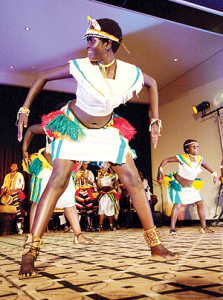
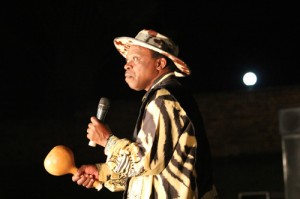
The children he sponsored and trained are the ones who have made Ndere a world renowned troupe and facilitated the formation of the Uganda Development Theater Association (UDTA) and the Ndere Foundation. The weight of cultural heritage is golden for Uganda in particular, though not considered so by the majority.For a cultural protagonist like Rwangyezi, issues with the 21st century should be blamed on individuals. Musical instruments like drums, adungu (local guitars), and other games like (omweso) traditional mancala game of the Ugandan people, have been abandoned for video games.
“For me, Ndere Troupe was an expression, and an outlet for an internal anger that I had been harboring for a long time,” said Rwangyezi. “By the time I started the troupe in, our cultural music had been so degraded that I was feeling so angry and wanted to find another way of bringing this music to the high table.
It is true that Africa entered the 21st century with huge unresolved issues, such as poverty, rapid urbanization, regional integration, gender inequality, food insecurity, political fragmentation, and the fact of occupying a subaltern position in the global community. In response to a cultural sacred, this should not be an excuse for these repercussions.
“Most of us want to live the European way, to the extent of bleaching ourselves. Wow! We have forgotten that even if we bleached for thousands of years, we would forever be black. For those who are still handicapped by the past still suffer from low self esteem, and therefore lack open minds for creativity and innovative ventures which explains poverty in African countries, especially Uganda,” he said.
It still bothers Rwangyezi that Western culture like music, dress code, dances are still considered modern, while Ugandan music is looked at as something backwards and primitive, especially by this generation. However, his good news is that there is still room for expansion in cultural heritage in Africa, though it can only be achieved through combined efforts in sensitization.
As the conversation went on, my curiosity for more compendium about the cultural protagonist arose, and I asked;
Evelyne: Who is your role mode?
Rwangyezi: “ I do not believe in such a thing as a role model. I worked in an experimental phase and there was no one to look up to. The question of a role model is an acceptance that someone is better than you. You are your own role mode! You have the capacity!”Evelyne: What has been your favorite performance so far?
Rwangyezi: “Every show comes with its own adrenalin. However, my most remembered performance was one in ‘warukuba, Jinja.’ This was a primary school where almost everyone who turned up had jiggers and was half naked. The way these kids consumed the performance was overwhelming. It was like they were struck by electricity.”
Another one was my very first show which yielded three people after the intensive advertisement. ”Evelyne: Since the next INTO conference is in Cambridge, any plans of performing?
Rwangyezi: “Frankly, I didn’t even know. Better organised, better recorgnised. Now that you have told me, I am going to look at it. But the problem is, instead of getting funding, I am busy chased by URA-Uganda Revenue Authority. I may not have the money to spend though.“Evelyne: What is the best way of seeing heritage to another level?
Rwangyezi: Education! It is the only Saviour, since we have hereditary traits. Today, for instance, children are sent to school at the age of two. Let us include cultural heritage in the curriculum. What is not written doesn’t exist. Content matters.

 44 (0)20 7824 7157
44 (0)20 7824 7157